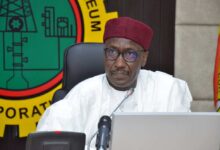Trending News
1 day ago
PRESIDENT TINUBU TO DUTCH INDUSTRY: PARTNERSHIPS MUST BE TRANSFORMATIVE
President Bola Tinubu says bilateral partnerships must be mutually beneficial, transformative, and must translate into…
Trending News
5 days ago
FOI: Rights Group Writes NNPC, Seeks Status Of Staff, Asabe Waziri, Who Owns Multi-million Naira Houses In Abuja, Lagos
A prominent Abuja based human rights group, Human Rights Writers Association of Nigeria (HURIWA), has…
Trending News
6 days ago
Oborevwori visits Okuama, says Residents ‘ll Return Soon
Delta State Governor, Rt Hon Sheriff Oborevwori, has visited Okuama with an assurance for the…
Trending News
1 week ago
NDLEA Partners Policy Makers at Grassroots on National Drug Control Master Plan.
A two day training on drug prevention, treatment and care organized by the National drug…






















